The political economy of development is an interdisciplinary field that investigates the relationships between political systems, economic structures, and developmental processes. This area of study analyzes how political institutions, governance mechanisms, and economic policies influence development trajectories across various nations and regions. Researchers in this field examine the impact of institutional frameworks, power dynamics, and resource allocation on economic growth, poverty alleviation, and social advancement.
In recent years, the political economy of development has garnered increased attention from policymakers, academics, and practitioners seeking to address the multifaceted challenges faced by developing countries. This field emphasizes that development extends beyond mere economic growth, encompassing the creation of inclusive and sustainable societies. It recognizes the significance of tackling issues such as inequality, corruption, and environmental degradation in pursuit of comprehensive development objectives.
By exploring the intricate connections between political and economic factors, the political economy of development provides crucial insights into the catalysts and obstacles of developmental progress. This approach enables a more nuanced understanding of the complex interplay between governance, institutions, and economic outcomes, informing evidence-based policymaking and development strategies.
Key Takeaways
- Political economy of development examines the relationship between politics and economics in shaping development outcomes.
- Institutions play a crucial role in development by providing the framework for economic and political interactions.
- Governance, including transparency, accountability, and rule of law, has a significant impact on development outcomes.
- The relationship between political economy and development is complex and multifaceted, with political factors influencing economic policies and outcomes.
- Case studies of successful and failed development projects provide valuable insights into the factors that contribute to or hinder development progress.
The Role of Institutions in Development
The Importance of Strong Institutions
Strong institutions are vital for creating an environment conducive to economic growth, investment, and innovation. They provide the necessary framework for protecting property rights, enforcing contracts, and regulating markets. Moreover, institutions also shape the quality of governance, public service delivery, and the rule of law.
The Consequences of Weak Institutions
On the other hand, weak or dysfunctional institutions can hinder development by creating uncertainty, inefficiency, and inequality. In many developing countries, institutions suffer from corruption, lack of transparency, and inadequate capacity, which erodes trust in public institutions and social cohesion.
The Central Role of Institutions in Development
The role of institutions in development is therefore crucial to understanding the challenges and opportunities facing developing countries. It is essential to address the weaknesses in institutions to mobilize resources for development projects, attract foreign investment, and implement effective policies.
Governance and its Impact on Development
Governance refers to the processes and structures through which authority is exercised and decisions are made. It encompasses the role of government institutions, civil society organizations, and private sector actors in managing public affairs. Good governance is essential for promoting economic development, social inclusion, and environmental sustainability.
It involves principles such as accountability, transparency, participation, and the rule of law. Effective governance ensures that public resources are used efficiently, public policies are responsive to citizens’ needs, and public institutions are accountable to the people. Conversely, poor governance can impede development by fostering corruption, mismanagement, and social unrest.
Weak governance often leads to a lack of trust in public institutions, which undermines social cohesion and economic progress. In many developing countries, governance challenges such as weak regulatory frameworks, lack of transparency, and limited citizen participation hinder the effectiveness of development efforts. Therefore, understanding the impact of governance on development is crucial for designing effective policies and interventions.
The Relationship between Political Economy and Development
The relationship between political economy and development is complex and multifaceted. Political economy examines how political processes and economic factors interact to shape development outcomes. It recognizes that power dynamics, distribution of resources, and decision-making processes are central to understanding the challenges and opportunities facing developing countries.
Political economy also explores how different interest groups, including governments, businesses, and civil society organizations, influence policy choices and development priorities. Moreover, political economy sheds light on the role of ideology, institutions, and historical legacies in shaping development trajectories. It recognizes that historical factors such as colonialism, conflict, and social movements have a lasting impact on the economic and political landscape of a country.
By examining the interplay between politics and economics, political economy offers valuable insights into the drivers of development and the barriers to progress. It provides a framework for understanding how power relations shape policy outcomes and how different actors navigate competing interests in pursuit of development goals.
Case Studies of Successful and Failed Development Projects
Case studies of successful and failed development projects offer valuable lessons for understanding the complexities of development processes. Successful projects provide insights into effective strategies for promoting economic growth, poverty reduction, and social progress. They highlight the importance of good governance, strong institutions, and inclusive policies in driving development outcomes.
On the other hand, failed projects shed light on the challenges and pitfalls that can hinder development efforts. They reveal the consequences of corruption, weak institutions, and inadequate policy design on development outcomes. For example, successful development projects in countries such as South Korea and Botswana demonstrate the importance of sound economic policies, investment in human capital, and good governance in achieving rapid economic growth and poverty reduction.
These cases illustrate how effective leadership, strategic planning, and institutional capacity can drive sustainable development outcomes. Conversely, failed projects in countries such as Venezuela and Zimbabwe underscore the detrimental effects of corruption, mismanagement, and political instability on economic development. These cases highlight the need to address governance challenges, build strong institutions, and promote inclusive policies to avoid development setbacks.
Challenges and Opportunities in Political Economy of Development

Addressing Inequality and Structural Barriers
One of the significant challenges is the persistence of inequality, which hinders inclusive growth and social progress. To address this, it is essential to tackle structural barriers such as limited access to education, healthcare, and economic opportunities.
Global Economic Forces and Local Development
Another challenge is the impact of global economic forces on local development trajectories. Developing countries often face external pressures such as trade imbalances, debt burdens, and volatile commodity prices that can undermine their development efforts.
Seizing Opportunities for Sustainable Development
However, there are opportunities for promoting sustainable development through innovative policies and partnerships. For instance, advancements in technology offer new possibilities for enhancing productivity, expanding access to financial services, and promoting inclusive growth. Moreover, there is growing recognition of the importance of environmental sustainability in development strategies, presenting an opportunity to integrate climate change mitigation, renewable energy deployment, and natural resource management into development planning.
By addressing these challenges and seizing these opportunities, the political economy of development can contribute to more equitable and sustainable development outcomes.
Future Directions for Research and Policy in Political Economy of Development
The future directions for research and policy in the political economy of development are likely to focus on several key areas. One important area is understanding the impact of technological innovation on development processes. This includes examining how digital technologies can be leveraged to promote economic inclusion, improve service delivery, and enhance productivity in developing countries.
Another area is exploring the implications of climate change for development trajectories. This involves assessing how environmental risks such as extreme weather events, water scarcity, and biodiversity loss affect economic growth, poverty dynamics, and social stability. Furthermore, future research is likely to delve into the role of global governance in shaping national development outcomes.
This includes examining how international trade agreements, financial regulations, and aid flows influence domestic policy choices and development priorities. Additionally, there is a need for research on innovative financing mechanisms for sustainable development. This involves exploring new models for mobilizing resources for infrastructure investment, social protection programs, and environmental conservation efforts.
By addressing these research priorities, policymakers can develop evidence-based strategies for promoting inclusive and sustainable development in a rapidly changing global landscape. In conclusion, the political economy of development offers valuable insights into the complex challenges facing developing countries. By examining the interplay between politics and economics, this field provides a framework for understanding the drivers of development and the barriers to progress.
Understanding the role of institutions, governance, and policy choices is crucial for promoting inclusive and sustainable development outcomes. By learning from successful and failed development projects, addressing key challenges, seizing opportunities for innovation, and prioritizing future research directions, policymakers can develop evidence-based strategies for promoting inclusive and sustainable development in a rapidly changing global landscape.
If you are interested in the political economy of development and governance, you may also find the case study on globalisation from Business Case Studies to be relevant. This case study explores the impact of globalisation on businesses and the external environment, providing insights into the interconnectedness of economies and the role of international institutions in shaping economic development.
FAQs
What is political economy of development?
The political economy of development refers to the study of how political and economic factors interact to shape the development process in a country or region. It examines the role of institutions, governance, and policies in promoting or hindering economic growth and social development.
What are institutions in the context of political economy of development?
Institutions in the context of political economy of development refer to the formal and informal rules, norms, and organizations that shape economic and political interactions within a society. This includes government structures, legal systems, property rights, and social norms.
What is the role of governance in the political economy of development?
Governance refers to the way in which power is exercised in the management of a country’s economic and social resources. In the political economy of development, good governance is seen as essential for promoting economic growth, reducing poverty, and ensuring sustainable development.
How do institutions and governance impact development outcomes?
Institutions and governance play a crucial role in shaping development outcomes. Well-functioning institutions and good governance can create an enabling environment for economic growth, investment, and innovation, while weak or corrupt institutions can hinder development efforts and perpetuate inequality.
What are some key factors that influence the political economy of development?
Some key factors that influence the political economy of development include historical legacies, social structures, power dynamics, international relations, and the quality of leadership. These factors can shape the incentives and constraints that influence policy choices and development outcomes.
 Meeting responsibilities to stakeholders (MP3)
Meeting responsibilities to stakeholders (MP3) 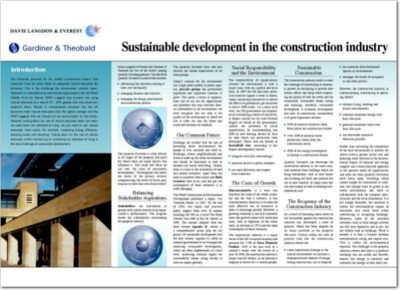 Sustainable development in the construction industry (PDF)
Sustainable development in the construction industry (PDF) 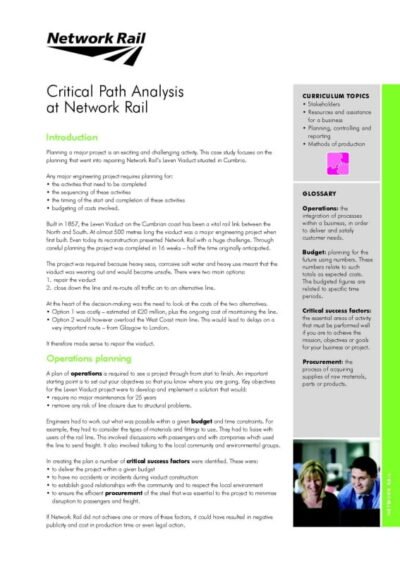 Critical Path Analysis at Network Rail (PDF)
Critical Path Analysis at Network Rail (PDF)  Meeting and exceeding consumer protection laws to drive competitive advantage (PDF)
Meeting and exceeding consumer protection laws to drive competitive advantage (PDF)  TNT A3 ePoster Edition 16 "Delivering a business strategy"
TNT A3 ePoster Edition 16 "Delivering a business strategy" 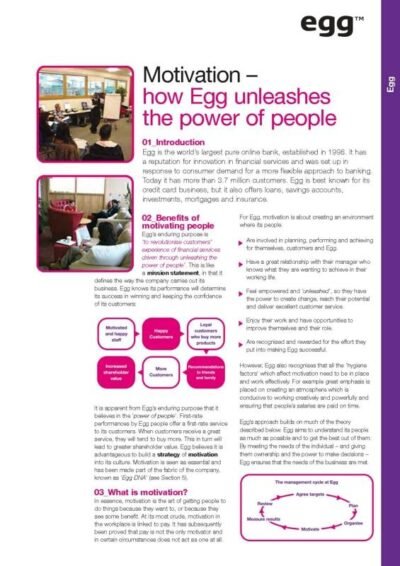 Motivation - how Egg unleashes the power of people (PDF)
Motivation - how Egg unleashes the power of people (PDF) 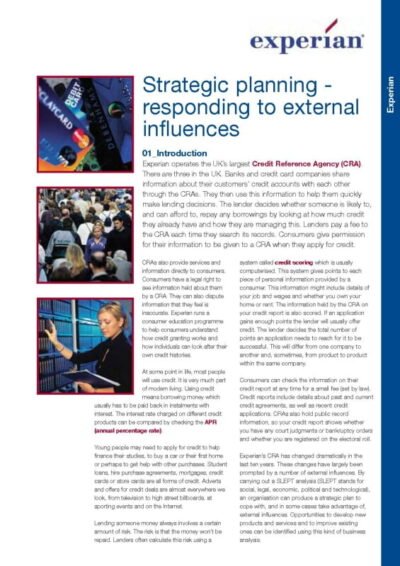 Strategic planning - responding to external influences (PDF)
Strategic planning - responding to external influences (PDF) 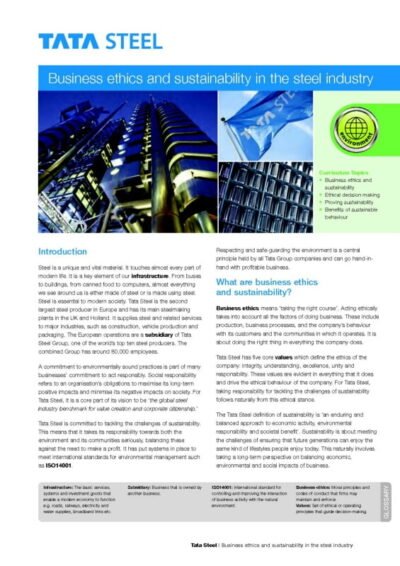 Business ethics and sustainability in the steel industry (PDF)
Business ethics and sustainability in the steel industry (PDF) 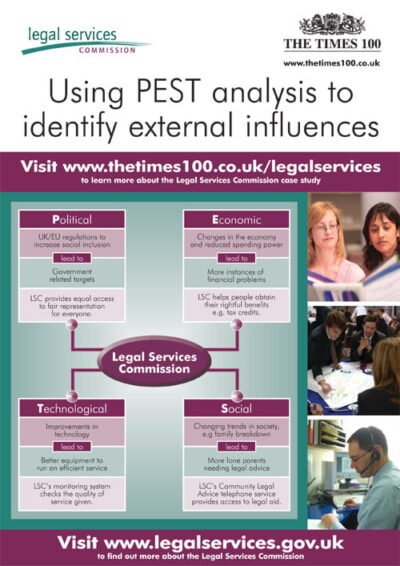 Legal Services Commission A3 ePoster Edition 13 "Using PEST analysis to identify external influences"
Legal Services Commission A3 ePoster Edition 13 "Using PEST analysis to identify external influences" 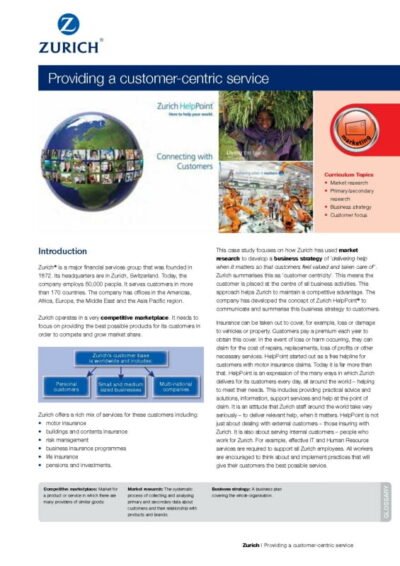 Providing a customer-centric service (PDF)
Providing a customer-centric service (PDF) 